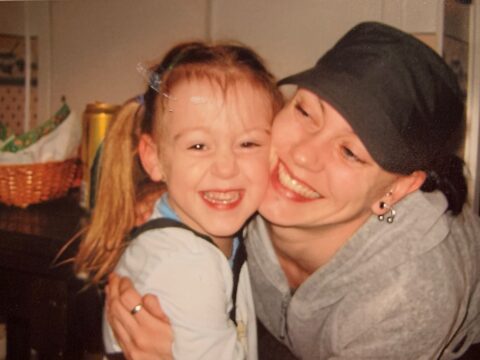I don’t remember a world where I heard sounds naturally. In fact, I don’t think that reality ever existed.
My mother, Jessica Hamer, didn’t find out until after a few months I was born.
“I was worried! You weren’t crying or anything,” says my mother. “I swear, I could vacuum right around you and you wouldn’t notice.”
The doctors told her I was deaf in both ears.
It started with a surgery. One where they cut a small slit on the side of my head. Then, they inserted a small, silicone implant with magnets in it. After the incision healed, it was time to put my hearing to the test.
When sound entered my world, it was like being born again. A whole new sense came about and it was scary for me at the tender age of a year and a half old.
However, years later, my Cochlear Implant was my best friend.
“You never wanted to take it off,” says my mother. “Not even to go to bed.”

Phaedra Hamer's mother only found out she was deaf a few months after she was born. Photo credit: Jessica Hamer
As a kid, I didn’t really notice that I was different. When I entered elementary school, it was all about fun and friends. No one really pointed out the weird thing on my head with the long cord running down it, attached to a fanny pack-looking accessory.
It wasn’t until the age of about 10 or so, when kids would ask me things like: “What’s on your head?” and “Does it hurt?” Afterwards I would tell them what the “weird thing” was, they would just say, “cool!” and move on.
I hardly had issues with my implant but there were certain things I had to do to be sure I took care of it.
- Don’t get it wet
- Take it off before going to bed.
- Always have a fresh battery in.
But one time in the second grade, I was in gym class and suddenly, I couldn’t hear anything. I stood there, stunned as people’s mouths kept moving and I didn’t know what they were saying.
My eyes glazed over as my friends turned to look at me and wondered what was wrong.
After I whispered to my friend what had happened, she gave me a hug and slowly said, “I’ll be right back.”
Then, she ran over to the teacher and whispered something to him. I never knew what she said, but what I’ll always remember is my Grade 2 teacher, Mr. Welch, looking up at me sitting on the stage alone as my friends continued playing.
He smiled, gave me a thumbs up and mouthed, “It’s okay.”
So for the first time, I sat on the sidelines with a notepad and my friends would write down what they would want to say to me.
Throughout my schooling, my educators have been kind, caring and understanding. I knew that I was never alone and that if I ever needed anything, my teachers would help me.
One of these teachers was Amy Ruff, a learning support teacher at my high school, Lisgar Collegiate Institute.
She greeted me before I started high school and reassured me that all of my hearing equipment and wheelchair would come with me, and that she would be there for support whenever I needed.
I had something called an Individual Education Plan (IEP).
The Ottawa Carleton District School Board defines it as a, “written plan outlining the special education programs and/or services required by a particular student based on the student’s strengths and needs.”
IEPs are reviewed and updated annually to ensure that accommodations students use are proving to be beneficial in their studies.
Ruff was there to help me with any learning accommodations I may have needed for exams, like using a laptop, writing tests or exams in an alternate setting, having extra time to complete exams or having a scribe to help write down answers.
“We really try to offer a lot of support up-front to our Grade 9 and 10 students with the hope that as the student gets older, they are more comfortable advocating for themselves and what they need,” says Ruff.
A few months into Grade 9, she gave me an opportunity to attend an event that celebrated children who had difficulties hearing and gathered them all at a local high school for a day of games and workshops.
I met kids at different levels of hearing than I –– ones who signed ASL and some who were non-verbal.
I am proud of the community I’m in.
It was very interesting to see other children like me, but was also very humbling to know that all of my mom’s efforts when I was younger made a big difference in who I am today.
Yes, it’s tedious to remember to charge my batteries, change them, take off my implant before going to bed or showering, but it’s part of my routine and is seamless to me – all just another thing in the day.
